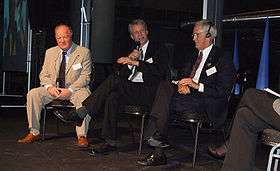Igor Volk
| Igor Volk | |
|---|---|
 2008 photo | |
| Cosmonaut | |
| Nationality | Soviet |
| Born |
Igor Petrovich Volk 12 April 1937 Zmiiv, Kharkiv Oblast, Ukrainian SSR, USSR |
| Died |
3 January 2017 (aged 79) Plovdiv, Bulgaria |
Other occupation | Pilot |
| Rank | Colonel, Russian Air Force |
Time in space | 11d 19h 14min |
| Selection | Air Force Group 5 |
| Missions | Soyuz T-12 |

Igor Petrovich Volk (Russian: Игорь Петрович Волк; Ukrainian: Ігор Петрович Волк; 12 April 1937 – 3 January 2017) was a cosmonaut and test pilot in the Soviet Union.
Military and test pilot
Igor Volk became a pilot in the Soviet Air Force in 1956. After graduation from the Fedotov Test Pilot School in 1965, he has joined the Gromov Flight Research Institute.[1][2] He logged over 7000 flight hours in over 80 different aircraft types. Over the years, he flew on all types of Soviet fighters, bombers, and transport aircraft. He showed outstanding abilities in complex tests of various airplanes at critical angles of attack, stall, and spin. He was the first who tested aircraft behavior at high super-critical angles of attack (around 90°) and performed aerobatics such as the "cobra" maneuver.[3]
Space program
Igor Volk was selected as a cosmonaut on 12 July 1977 and flew as Research Cosmonaut on Soyuz T-12, the 7th expedition to Salyut 7. One goal of the mission was to test the effects of long-duration spaceflight on Volk's return flight piloting as a precursor to piloting the Space Shuttle Buran.[3] He served as the head of cosmonaut training for the Buran program and after the project's cancellation, as a Flight Tests Deputy at the Gromov Flight Research Institute in 1995 before retiring in 1996. He previously served as President of the National Aero Club of Russia and Vice President of the Fédération Aéronautique Internationale. As recognition for his contributions as a test pilot and cosmonaut he was awarded the Hero of the Soviet Union on 29 July 1984.
Other accomplishments
Volk was also an inventor and was planning a new four-person concept flying car, called the Lark-4 which takes off and lands at 45 km/h (28 mph) using a 27-meter (89 ft) runway. It consumes 11 litres (3 gallons) of fuel for every 100 km (62 mi) traveled and cruises at around 637 km/h (396 mph).
Personal life
Volk was married and had two children. He died on 3 January 2017 while on holiday in Plovdiv, Bulgaria. He was 79.[4]
Honours and awards
- Title of Hero of the Soviet Union
- Title of Pilot-Cosmonaut of the USSR
- Title of Honoured Test Pilot of the USSR
- Title of Zhukovsky Honorary Citizen
- Order "For Merit to the Fatherland" 4th class
- Order of Lenin (USSR)
- Order of the Red Banner of Labour (USSR)
- Order of Friendship of Peoples (USSR)
- Medal "For Merit in Space Exploration"
References
- ↑ Знаменская, Наталья, ed. (2002). ШЛИ со временем [ShLI in Time] (in Russian) (2 ed.). Жуковский: ООО "Редакция газеты "Жуковские вести". p. 400.
- ↑ Evans, Ben (2012). Tragedy and Triumph in Orbit: The Eighties and Early Nineties. Springer Science & Business Media. p. 614. doi:10.1007/978-1-4614-3430-6. ISBN 9781461434306.
- 1 2 Hall, Rex; Shayler, Davide; Vis, Bert (2005). Russia's Cosmonauts: Inside the Yuri Gagarin Training Center. Chichester, UK: Praxis Publishing. pp. 335–6. ISBN 0-387-21894-7.
- ↑ "Cosmonaut Igor Volk dead at 79". SpaceFlight Insider. 4 January 2017. Retrieved 11 January 2017.
External links

- Detailed biography of Igor Volk
- Biography at Astronautix